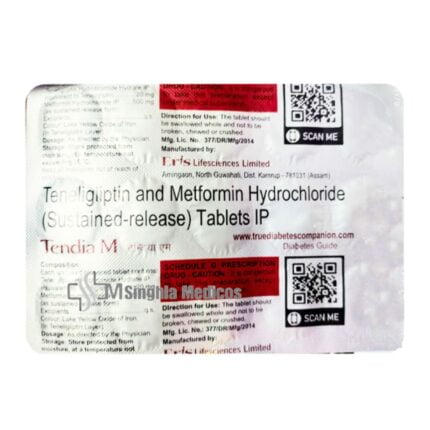
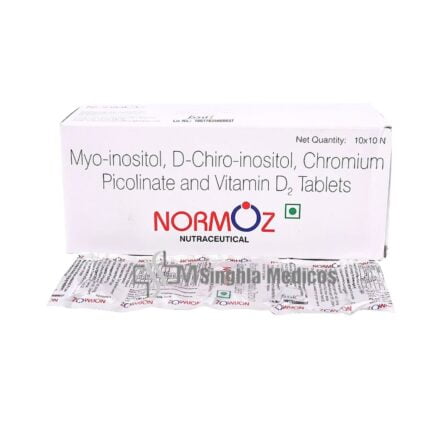
Nebzmart-G 25mcg Smartules 2ml
₹453.60 Original price was: ₹453.60.₹408.24Current price is: ₹408.24.
![]() Prescription Required
Prescription Required
Salt : Glycopyrrolate (25mcg)
Manufacturer : Glenmark Pharmaceuticals Ltd
Packing : 8 respules in 1 packet
Product Introduction
Tendia M Tablet SR is a medication commonly prescribed for the management of type 2 diabetes mellitus. This oral hypoglycemic agent is a combination of two active ingredients: Teneligliptin and Metformin. Each component works through different mechanisms to control blood sugar levels, offering a synergistic effect that enhances overall glucose management.
- Teneligliptin: Teneligliptin is a dipeptidyl peptidase-4 (DPP-4) inhibitor. By inhibiting the DPP-4 enzyme, it increases the levels of incretin hormones, which in turn increase insulin secretion and decrease glucagon levels, leading to better glucose control.
- Metformin: Metformin belongs to the biguanide class of drugs. It reduces hepatic glucose production, decreases intestinal absorption of glucose, and improves insulin sensitivity by increasing peripheral glucose uptake and utilization.
Tendia M Tablet SR is designed for sustained release (SR), meaning it releases the active ingredients slowly over time to provide a prolonged therapeutic effect and maintain steady blood glucose levels throughout the day. This formulation helps in reducing the frequency of dosing and enhances patient compliance.
Uses of Tendia M Tablet SR
Tendia M Tablet SR is primarily used in the management of type 2 diabetes mellitus. It is prescribed when diet, exercise, and monotherapy with either Teneligliptin or Metformin alone do not provide adequate glycemic control. The combination therapy of Tendia M Tablet SR is beneficial for:
- Improving Glycemic Control: By targeting multiple pathways involved in glucose regulation, Tendia M Tablet SR effectively lowers both fasting and postprandial blood glucose levels.
- Reducing HbA1c Levels: This medication helps in reducing the glycated hemoglobin (HbA1c) levels, an important marker of long-term glucose control.
- Preventing Diabetes Complications: By maintaining optimal blood glucose levels, Tendia M Tablet SR helps in reducing the risk of complications associated with diabetes, such as neuropathy, nephropathy, retinopathy, and cardiovascular diseases.
Benefits of Tendia M Tablet SR
The combination of Teneligliptin and Metformin in Tendia M Tablet SR offers several benefits:
- Enhanced Glycemic Control: The dual action of Teneligliptin and Metformin provides a comprehensive approach to managing blood sugar levels.
- Convenience: The sustained release formulation allows for once-daily dosing, improving patient adherence to the treatment regimen.
- Weight Neutrality: Unlike some other antidiabetic medications, Tendia M Tablet SR is weight-neutral, meaning it does not cause significant weight gain.
- Low Risk of Hypoglycemia: The risk of hypoglycemia (low blood sugar levels) is lower with this combination therapy compared to other treatments, making it a safer option for many patients.
- Cardiovascular Benefits: Emerging evidence suggests that DPP-4 inhibitors like Teneligliptin may have cardiovascular benefits, adding an extra layer of protection for patients with diabetes who are at higher risk of heart disease.
Side Effects of Tendia M Tablet SR
While Tendia M Tablet SR is generally well-tolerated, some patients may experience side effects. These can range from mild to moderate in severity. It is important to monitor for any adverse reactions and consult a healthcare provider if they occur. Common side effects include:
- Gastrointestinal Issues: Metformin, one of the components of Tendia M Tablet SR, is known to cause gastrointestinal side effects such as nausea, vomiting, diarrhea, and abdominal discomfort. These symptoms are usually transient and may subside with continued use.
- Headache: Some patients may experience headaches while taking Tendia M Tablet SR.
- Upper Respiratory Tract Infections: There is a slightly increased risk of upper respiratory tract infections with the use of DPP-4 inhibitors like Teneligliptin.
- Hypoglycemia: Although the risk is lower compared to other antidiabetic agents, hypoglycemia can still occur, especially when Tendia M Tablet SR is used in combination with other glucose-lowering medications.
- Vitamin B12 Deficiency: Long-term use of Metformin has been associated with reduced absorption of vitamin B12, which can lead to deficiency over time. Monitoring and supplementation may be necessary.
- Allergic Reactions: Rarely, allergic reactions such as rash, itching, or swelling can occur. Immediate medical attention is required if any signs of a severe allergic reaction are observed.
References
Disclaimer
Singhla Medicos’s primary intention is to ensure that its consumers get information that is reviewed by experts, accurate and trustworthy. The information and contents of this website are for informational purposes only. They are not intended to be a substitute for professional medical advice, diagnosis, or treatment. Please seek the advice of your doctor and discuss all your queries related to any disease or medicine. Do not disregard professional medical advice or delay in seeking it because of something you have read on Singhla Medicos. Our mission is to support, not replace, the doctor-patient relationship.
Shipping Policy
We ship across India. Note – this is subject to change as per Company Wishes. Packages will be shipped in 24 working hours. we are closed on Sundays and will reach you in the next 2-4 days post shipping. We give the estimated time of delivery on the shipping page. However, these are indicative and depend on our shipping partner.
Delivery
The delivery times are subject to location, distance, and our logistics partners. We are not liable for any delays in delivery by the courier company/postal authorities but will help you track down a package through our partner courier services.
Your purchases may reach you from various locations in more than one package. But rest assured, you will be charged one delivery fee for the entire order. As soon as your package ships, we will email you your package tracking information.
We are bound in coverage by their reach even though we use some of India’s largest logistics companies for shipping. In case your address is in a location not served by them we would contact you to find an alternative solution to make your products reach you.






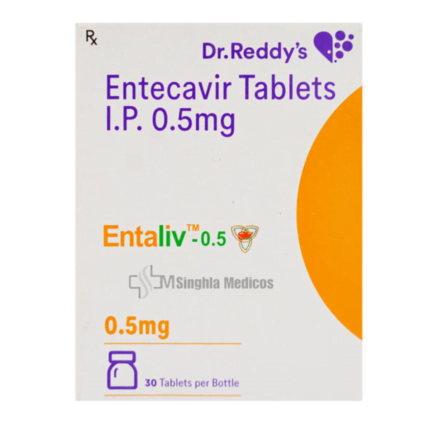
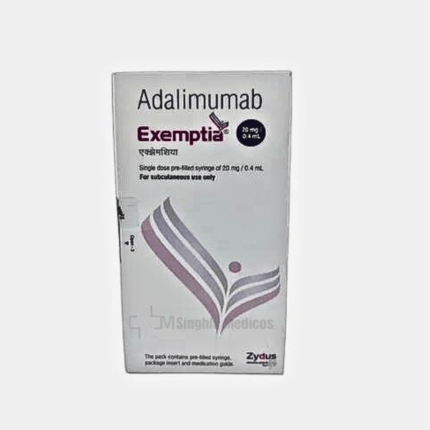
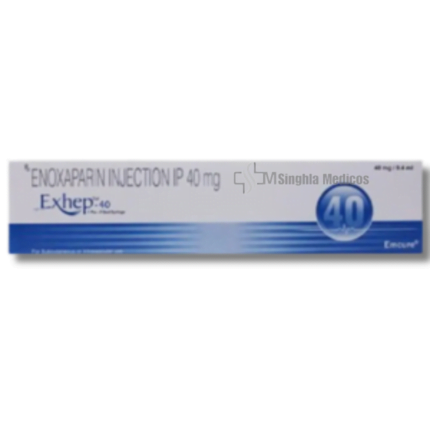
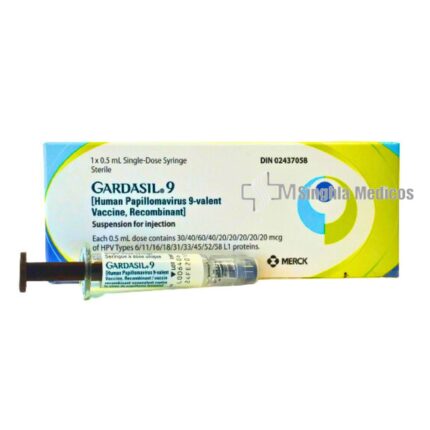


Reviews
There are no reviews yet.